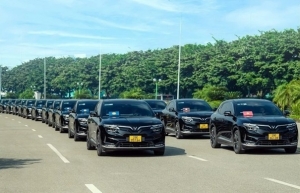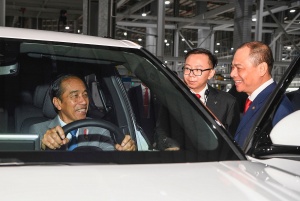Indonesians feeling the allure of Vietnam
 |
| Vietnamese State President Vo Van Thuong (right) held bilateral talks with counterpart Joko Widodo last week |
“Both nations have agreed to expand cooperation in new sectors such as smart finance, energy transition, digital transformation, innovation, and development of e-vehicles and battery,” said Vietnam’s Ministry of Foreign Affairs (MoFA).
Both leaders underscored a major direction for cooperation in the coming time via agreeing to further increase political trust, visit exchanges, and high-level contacts.
“The two countries will effectively carry out bilateral cooperation mechanisms and soon formulate the Action Programme for the 2024-2028 period,” the MoFA said. “The two leaders have also agreed that based on significant cooperation achievements over the past 70 years, it is necessary to elevate the two nations’ existing strategic partnership to a new height.”
The two sides agreed to increase cooperation in agriculture, fisheries, ICT, education and training, culture, sports, and tourism, and at the same time expand collaboration to new and potential spheres like smart financing, the energy transition, digital transformation, innovation, and developing the electric vehicle and battery ecosystem.
According to the Indonesian Embassy to Vietnam, many Indonesian businesses are targeting Vietnam as an attractive business and investment location. They are operating in many sectors such as coal, education, vehicle components, infrastructure, property, consumer products, agriculture, and plastic moulding.
Many Indonesian companies have been successfully operating in Vietnam, including Thang Long Cement, Ciputra Group, Dynaplast Vietnam, Japfa Comfeed, Akebono Brake Astra Vietnam, and Vietmindo Energitama.
“Indonesia considers Vietnam’s position as strategic for the enhancement of mutually beneficial economic cooperation. Foreign investments play a significant role in driving economic growth and development,” said Denny Abdi, Indonesian Ambassador to Vietnam. “The inflow of capital and expertise leads to jobs creation, stimulating economic activity, and improving the overall business environment. Indonesian investors are keen to seize investment opportunities in Vietnam.”
In one example, Indonesian animal feed producer Japfa Comfeed Vietnam is expected to continue investing in Vietnam.
“Japfa Vietnam holds a significant position as one of the key markets in Asia for Japfa, making it a top priority in the group’s expansion strategy,” a company representative told VIR.
Building on the growth achieved in previous years, the company inaugurated the animal feed factory in the southern province of Binh Phuoc with an investment of nearly $16.8 million and the aquatic feed mill in the Mekong Delta province of Long An in 2023 with the aim to achieve an output of 1.5 million tonnes.
“In 2023, the Vaksindo factory project in the northern province of Hung Yen invested in research and development of internal vaccines, thereby ensuring disease safety for livestock farms nationwide. This project holds tremendous promise and is expected to enhance the overall business efficiency of Japfa Vietnam in the future,” he continued.
Capitalising on the strengths of its animal feed and closed farm system, Japfa Vietnam aims to expand its presence in the food business by putting into operation of a poultry slaughterhouse in Binh Phuoc with a design capacity of 60,000 heads a day. Moreover, Japfa Vietnam will develop online distribution channels and establish partnerships with supermarket chains, kitchens, and restaurants.
In another case, Indonesian on-demand service platform Gojek has made significant progress and impact since its entry into the market in 2018. It now offers services in Hanoi and Ho Chi Minh City, and Binh Duong and Dong Nai provinces for ride-hailing, online food delivery, and package delivery – all of which help to make life easier for consumers while improving income opportunities for its driver-partners and small restaurants and eateries.
In 2023, Gojek introduced more than 10 new product features making services more accessible to consumers, enhancing customer experience, and creating products that lower structural costs and appeal to budget consumers.
Currently, Indonesian investors are also interested in Vietnam’s infrastructure and property industry. The Vietnamese government is also undertaking promotional activities to attract foreign investors in the development of the property sector by facilitating the construction of facilities and infrastructure, allocation of land and stabilisation of land prices, and especially improving the transparency and simplification of administrative procedures.
“Development of the property sector is crucial to the Vietnamese economy, following the agro-industrial and service sectors. Ciputra Group in Hanoi pioneered investment in the property sector including industry, real estate and apartments, and the opportunities are still open for investors from Indonesia,” Ambassador Abdi said.
“Most of Indonesian investments in Vietnam are located in the southern region. The sectors range from manufacturing products, fast-moving consumer goods, chemicals and pharmaceuticals to transportation, travel, and logistics,” Ambassador Abdi said. “These companies produce goods and services for the Vietnamese market, as well as for export.”
According to Vietnam’s Ministry of Planning and Investment, cumulatively as of December 20, 2023, Vietnam had 122 valid ventures by Indonesian enterprises registered at $651.43 million.
Available data from the Indonesia’s Ministry of Investment/Indonesia Investment Coordinating Board showed that for 2014-2022 period inbound investment from Vietnam in Indonesia comprised of 43 projects, operating in trade and repairs, other services, and basic metal industry sectors, with only a few projects in sectors like hotel and restaurants and fisheries.
According to Ambassador Abdi, Indonesia and Vietnam need to have a comprehensive understanding of national investment regulations and to maintain the growing economy and favourable investment climate.
“We need to make both markets attractive destinations for investment. On a larger scale, both countries should also refer to the commitments in ASEAN as guidelines towards regional economic integration and realising the ASEAN Economic Community 2025,” the ambassador said. “Rather than being each other’s competitor in global market access, Indonesia and Vietnam would benefit more by working together and optimise our assets by strategically investing in sectors where both have comparative advantages.”
When it comes to trade, Indonesia is now the third-biggest trade partner of Vietnam in Southeast Asia, and Vietnam is the fourth-largest trade partner of Indonesia in the region.
Bilateral trade rose from $5.6 billion in 2014 to $14.1 billion in 2022. In the first 11 months of 2023, the figure hit $12.6 billion, including Vietnam’s exports of $4.7 billion and imports of $7.9 billion. The two nations have set a target of reaching $15 billion in the coming time.
| Indonesia was part of one of the earliest security and defense pacts with Vietnam, via the establishment of a military attaché office in Vietnam in 1964. The two countries regularly exchange defence and security delegations, and signed a number of bilateral defence cooperation agreements, actively participating in activities within the ASEAN framework. In 2021, the two sides organised a number of online activities, including the second deputy minister-level policy dialogue; a navy dialogue; and the signing of an MoU by the two countries’ maritime police on maritime security and safety cooperation. The Indonesian defense minister officially visited Vietnam in May 2022. Also that year, the sides inked two MoUs on cooperation in anti-terrorism and the fight agaisnt drug trafficking on the occasion of a state visit to Indonesia by Vietnamese President Nguyen Xuan Phuc in December. As for cooperation in other fields, Indonesia provides Vietnam with a number of short-term, medium-term, and long-term scholarships each year in the sectors of education, culture, and language. Over the years, the two countries have also clinched a number of MoUs on cooperation in fisheries and marine issues (2010); on agriculture, finance, and energy cooperation (2013); cooperation in agriculture, finance, and energy (2013); a partnership for education (2017); working together on justice and law; coal supply cooperation; rural development agreements; gas supply in cross-border areas (2017); and a joint communiqué on voluntary participation in international cooperation on combating illegal, unreported, and unregulated fishing, as well as promoting sustainable fisheries management (2018). Besides that, an MoU was also inked in cooperation in energy and mineral resources in December 2022. Meanwhile, the two countries already have direct flights connecting Hanoi and Ho Chi Minh City with Jakarta and Bali, operated by Vietjet Air and Vietnam Airlines. In 2022, Vietnam welcomed about 36,000 Indonesian tourists, an increase of 15,000 compared to 2021 (the number was 106,000 in 2019). By the end of October 2023, there were more than 81,000 Indonesian tourists coming to visit Vietnam. Source: Ministry of Foreign Affairs |
 | Vietnam, Indonesia eye cooperation in EV development, food security, manpower Indonesian Industry Minister Agus Gumiwang Kartasasmita has invited Vietnam to cooperate in the development of several sectors, including the electric vehicle (EV) industry, green industry, food security, research and development, and human resources. |
 | VinFast and GSM announce $2.1 billion investment for Indonesia VinFast and Green and Smart Mobility Corporation (GSM) have forged a groundbreaking alliance with GoTo Gojek Tokopedia of Indonesia. |
What the stars mean:
★ Poor ★ ★ Promising ★★★ Good ★★★★ Very good ★★★★★ Exceptional
Related Contents
Latest News
More News
- Hermes joins Long Thanh cargo terminal development (February 04, 2026 | 15:59)
- SCG enhances production and distribution in Vietnam (February 04, 2026 | 08:00)
- UNIVACCO strengthens Asia expansion with Vietnam facility (February 03, 2026 | 08:00)
- Cai Mep Ha Port project wins approval with $1.95bn investment (February 02, 2026 | 16:17)
- Repositioning Vietnam in Asia’s manufacturing race (February 02, 2026 | 16:00)
- Manufacturing growth remains solid in early 2026 (February 02, 2026 | 15:28)
- Navigating venture capital trends across the continent (February 02, 2026 | 14:00)
- Motivations to achieve high growth (February 02, 2026 | 11:00)
- Capacity and regulations among British areas of expertise in IFCs (February 02, 2026 | 09:09)
- Transition underway in German investment across Vietnam (February 02, 2026 | 08:00)

 Tag:
Tag:

















 Mobile Version
Mobile Version